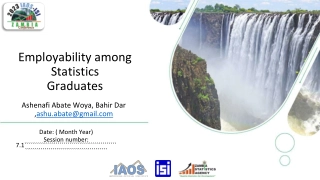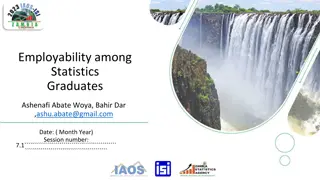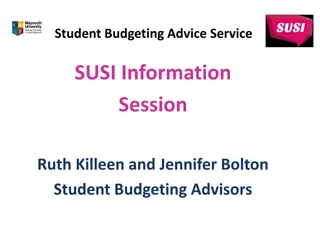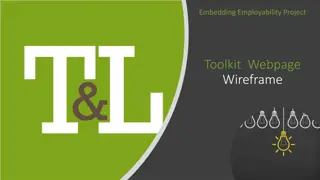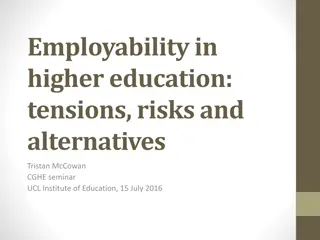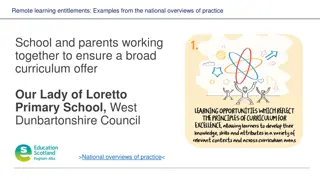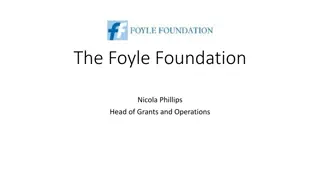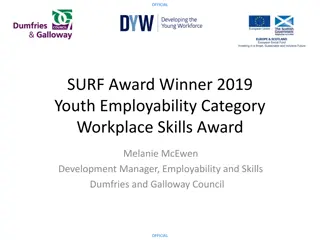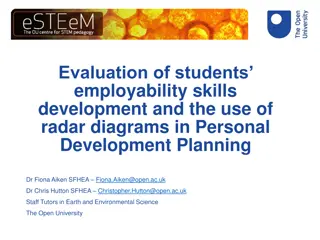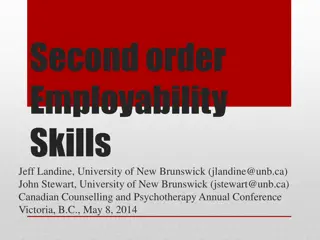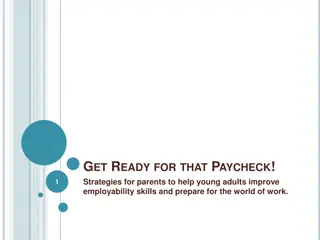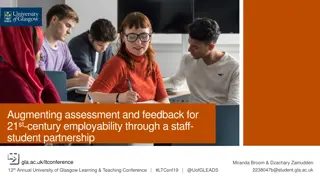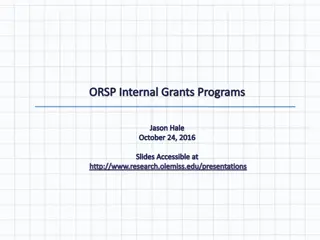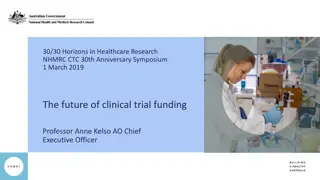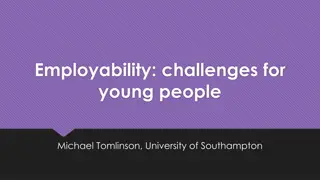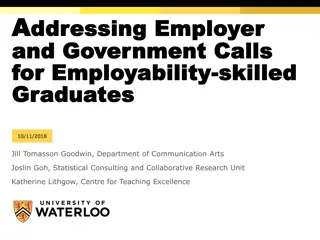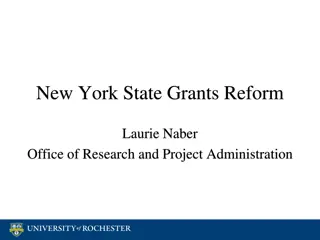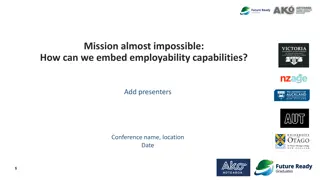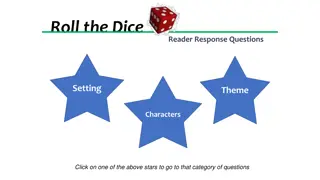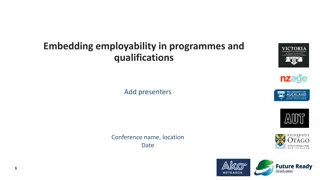
West Dunbartonshire Employability Grants & Funding Information
Discover the availability of around £700,000 in funding for specialist employability support in West Dunbartonshire. Learn about the grant outcomes, principles, and the Working 4U Employability services aimed at enhancing employment opportunities for residents facing barriers. Explore the key objectives under the No One Left Behind initiative to promote sustainable employment and tackle inequalities in the labor market.
Download Presentation

Please find below an Image/Link to download the presentation.
The content on the website is provided AS IS for your information and personal use only. It may not be sold, licensed, or shared on other websites without obtaining consent from the author. If you encounter any issues during the download, it is possible that the publisher has removed the file from their server.
You are allowed to download the files provided on this website for personal or commercial use, subject to the condition that they are used lawfully. All files are the property of their respective owners.
The content on the website is provided AS IS for your information and personal use only. It may not be sold, licensed, or shared on other websites without obtaining consent from the author.
E N D
Presentation Transcript
Priority Groups Priority Groups West Dunbartonshire Employability Grants- Information Session 25-26 Clare Henry Working 4U Coordinator
Funding Available Funding Available At present approx. 700,000 is available for commissioning. Funds that will contribute to delivery in 25/26 are as follows: UK Government Shared Prosperity Scottish Government -No One Left Behind (NOLB) Scottish Government - Parental Employment Support Scottish Government - Specialist Employability Support* *Specialist Employability Support Specialist Employability Support is targeted at people with significant and on-going barriers to employment whose needs are not able to be met by mainstream employability support. Typically, they will require longer-term access to services including significant aftercare and in-work support to sustain employment. Participants may include, but are not limited to, disabled people including those with severe and enduring mental ill health, in recovery from addictions or experiencing long term health conditions and who require support from Key Workers with relevant experience and training.
Our Grant Outcomes and Principles Our Grant Outcomes and Principles Both Scottish and Local Government are committed to the shared ambition of No One Left Behind and to tackling child poverty through a person-centred approach that is more flexible and responsive to the changing labour market, tackles inequalities and grows Scotland s economy is needed now more than ever to shape a collective economic and wellbeing response. KEY OUTCOMES Inactive and unemployed residents entering employment Sustained employment for residents who have entered employment Improved labour market situation for those in employment Increasing income through employment for low-income families
Our Grant Outcomes and Principles Our Grant Outcomes and Principles 6 NOLB Principles flexible and person-centred support Be more straightforward for people to navigate Be better integrated and aligned with other services, particularly with health, justice and housing provision Provide pathways into sustainable and fair work Be driven by evidence, including data and the experience of users Support more people particularly those facing multiple barriers to move into the right job, at the right time
Working 4U Employability services Working 4U Employability services
Priorities for West Dunbartonshire Priorities for West Dunbartonshire Funder Priorities Economically Inactive, Vulnerable Young people, Ethnic Minorities, Disabilities, Parents Data analysis- reach, barriers Internal Evaluation with core W4U Employability staff
Priorities for West Dunbartonshire Priorities for West Dunbartonshire 7 themes 1. Ethnic Minorities English Language Support 2. People with disabilities 3. Families facing poverty 4. Community Justice 5. Vulnerable Young People 6. Vocational Activity 7. Health and wellbeing Support
What Type of Provision Are We Looking For? What Type of Provision Are We Looking For? Fundable Provision Priority Group(s) and Themes Rationale/evidence of need /useful data Pipeline Stages Ethnic Minorities - Housing, employability, college and community learning services report an ongoing high demand for English language support and waiting lists. 1/2 1. Innovative and effective programmes that develop the English-speaking skills of refugees, asylum seekers, or other minority groups to enable them to access and sustain employment. People for whom a lack of English language skills is impacting on their ability to progress into work Employability services report a significant increase in the numbers of clients from minority ethnic groups engaging often with low English language skills, a key barrier to employment. The key need is to develop participants conversational English in suitable learning environments where participants with a range of abilities can develop confidence and ability. CLD and the local college deliver ESOL however our needs assessment for employability clients suggest that there is a need for conversational classes/support, both generic as well as sector specific.
What Type of Provision Are We Looking For? What Type of Provision Are We Looking For? Priority Group(s) and Themes Rationale/evidence of need /useful data Pipeline Fundable Provision Stages 1-5 Disabilities Of the 887 individuals accessing employability support from Apr-Dec 2024 the figures below are a snapshot of those recording a disability or long- term condition. 2.1 All stage supported employment programmefor people (all age) with disabilities as detailed opposite who wish to progress into paid employment. Support should include in work support as required. People with disabilities or long-term health conditions Autistic Spectrum Disorder/Condition 75 Learning difficulty 91 Learning disability 46 Physical disability 62 2.2 Other specialist employment programmes supporting people with disabilities and long term conditions into employment. Sight/hearing/speech impairment 32 Long-term illness, disease or condition 157 Priority will be given to initiatives aimed at removing barriers to employment, such as providing accessible accommodation, offering skills training tailored to the needs of disabled individuals, and promoting inclusive hiring practices among local businesses. In addition to key worker support, Project Search commenced operation in West Dunbartonshire in 2024-25 and commissioned provision enhances our service offer to those with disabilities/long term conditions.
What Type of Provision Are We Looking For? What Type of Provision Are We Looking For? Priority Group(s) and Themes Rationale/evidence of need /useful data Pipeline Fundable Provision Stages Stage 1-5 Community Justice - Justice System experienced residents In Scotland, approximately 1 in 3 men and 1 in 10 women of working age have a criminal conviction. Engaging with the community justice experienced population is recognised as particularly challenging. Grant applicants are encouraged to clearly identify how they will do this. 3. Specialist support for people with experience of the Community Justice system which are impacting on access to employers/jobs. Working closely with Social Work colleagues to identify clients who will benefit from employability support across the justice process. Evidence suggests that access to specialist support and guidance to justice experienced residents and potential employers in relation to convictions and access to appropriate work experience placements will be a key aspect of delivery.
What Type of Provision Are We Looking For? What Type of Provision Are We Looking For? Priority Group(s) and Themes Rationale/evidence of need /useful data Pipeline Fundable Provision Stages All stages Families facing poverty - Parents/kinship carers including those affected by in-work poverty. 28% of children in West Dunbartonshire are living in poverty. 4.1 Engagement, essential and Life- skills programmes for parents that will help to support the wider development needs of parents including wellbeing and social prescription and will positively impact on their employability journey. This should include 121 support and group work. A key focus of our parental employment work is to reach those parents more likely to be impacted by poverty: Single parents Families impacted by disability Parents under 25 Parents with children under 1 Parents with 3 or more children 4.2 Other programmes supporting parents into employment or improved employment. Ethnic minority parents Experience of the care system Understanding the prevalence of households likely to be affected by disadvantage is crucial for employability, learning and support initiatives. It is essential to address the specific challenges faced by these families in the area and tailor support services accordingly.
What Type of Provision Are We Looking For? What Type of Provision Are We Looking For? Priority Group(s) and Themes Rationale/evidence of need /useful data Pipeline Fundable Provision Stages Stages 1-4 Vulnerable Young People Key workers support young people, and commissioned provision enhances the range of options available to help young people progress towards and into work. This includes transition key workers in schools and Thrive and Ready to Thrive personal development programmes. 5.1 Personal Social Development programmes for school leavers/ young people up to 29 years which provide training; essential skills development, qualifications, employment related skills and include work experience. School leavers, unemployed or economically inactive young people including care experienced young people and young people who are neurodiverse. Stages 1-4 The Working4U Thrive and Ready to Thrive Programme is a stage 1 personal development programme supporting young people aged 16 24 to progress towards a positive destination of their choice. 5.2 Programmes specifically for young peopleaged 16-29 years including foundation skills; industry specific training; work experience; job matching; access to Apprenticeship programmes (please detail the frameworks training aligns with) and in work support.
What Type of Provision Are We Looking For? What Type of Provision Are We Looking For? Priority Group(s) and Themes Rationale/evidence of need /useful data Pipeline Fundable Provision Stages 3/4 Vocational Activity - residents requiring vocational skills and work experience to progress into employment The LEP recognises the need to provide vocational skills training in sectors where there are likely to be vacancies over the coming year. Delivery of 4 -12-week vocational skills programmes/sector- based work academies, which are linked to local employers and evidenced work opportunities. The aspiration of the SEG is to support those gaining vocational skills to progress into related and sustainable work opportunities in West Dunbartonshire, or within other travel to work areas. Programmes must include industry recognised qualifications/certificates; a minimum of 2 weeks work experience and guaranteed interviews. Much of what we commission will be all age and open to all target groups however we need to ensure our provision meets the specific needs of our priority groups who may benefit from a more targeted and bespoke programme, in particular: We have an all age offer in Working4U with people requesting vocational training. (Working4U has the ability to offer vocational training in customer care and social care). Some of this can be met through accessing training on an individual basis however we require a wide range of relevant vocational courses for groups of clients to meet client and employer needs. Parents who need training provision and jobs with school /parent friendly hours and conditions. School leavers up to 29yrs who require vocational programmes adapted to meet their specific needs and job opportunities including apprenticeships. This support should offer progressions for residents participating in wellbeing and personal development programmes. Applicants may opt to deliver vocational programmes for all ages (no specific target group) and/or courses bespoke for parents or young people.
What Type of Provision Are We Looking For? What Type of Provision Are We Looking For? Priority Group(s) and Themes Rationale/evidence of need /useful data Pipeline Fundable Provision Stages n/a Health and Wellbeing support 52% of those engaging with employability services from Apr-Dec 2024 report a health issue including mental health. Delivery of wellbeing courses/programmes that will positively impact on participants employability journey. Evidence suggests the most common issues relate to mental health and that these issues impact on clients ability to engage and progress towards and into employment.
What Type of Provision Are We Looking For? What Type of Provision Are We Looking For? Milestone Date Wednesday 26thMarch 2025 Grant opens for applications Monday 31stMarch 11.30am on Teams Information sessions for potential applicants please attend 1 session Wednesday 2ndApril 11.30am on Teams Wednesday 26thMarch 2025 Q&A open Friday 11thApril 2025 Q&A closure Friday 18thApril noon Application deadline W/C Monday 21stApril Assessment process W/C Monday 21stApril Application outcomes notified Delivery end End March 2026

